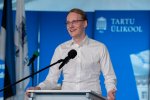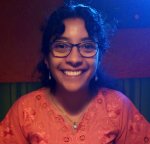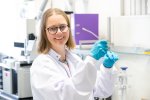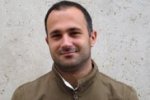The stories of our people
Get to know our people and their stories. We have a few stories here, but we hope they are inspiring and help you understand why someone is working here, their role, the possibilities of growth, and many more.
Teaching provides an opportunity to take stock of your skills and knowledge and extract the useful parts to share them with others. It gives a chance to meet new people every year – people who are unlike you but at the same time quite like you. You can get to know each other and learn from one another. It is an opportunity to constantly test your thinking, self-expression, and design skills. Teaching at the university offers a lot of possibilities and freedom. It gives a powerful sense of success if your work bears fruit, and you can evoke understanding and curiosity in your students. People who work in other fields should also consider teaching. When I started teaching, I also did it part time. Teaching does not need to be a full time job. It is especially enriching for the students when experiences, mindsets, and examples gained elsewhere are brought to the classroom. For a lecturer who is a freelancer or an entrepreneur, teaching provides a welcome source of stability. It is an honour and a privilege.
I am from Mexico, and I have studied Estonian for many years and continue learning. I can learn Estonian free of charge as an employee of the University of Tartu. Every semester I try to find Estonian courses and develop my skills. The pronunciation is difficult for me, and the most complex words are the ones with letters „õ-, ä-, ö- and ü“. I try to practice as much as I can, and if possible, I will speak Estonian with Estonians. Learning Estonian isn’t easy, and it will take time, but it’s not impossible.
To work in IT at the University of Tartu is to be a part of the everyday work of a very large Estonian organisation and to ensure that the whole university could offer high-quality education and engage in research and development. In today’s society, we expect to have access to digital content, document management, and various applications. The IT solutions and decisions made at the UT must support the organisation and its staff and students in achieving their goals. Considering the IT-related needs and future plans, I can say that IT will continue to provide a supporting role but at the same time serve as a driving force. As the university is a very large organisation with many ideas and varying individual needs, we need to find common ground. There is no single solution that would fit all. We are aware that big ships turn slowly, but by contributing to the process, we can ensure that the ship moves in the right direction and offers the required functionality. The University of Tartu is a prestigious employer, and by working here, you can take part in creating Estonia’s future and support high-quality education and research.
I am an archaeo chemist, i.e. an archaeologist who combines various modern laboratory methods to discover our distant past. I am the founder of the interdisciplinary research lab Archemy at the departments of analytical chemistry and archaeology. It is the first research lab of its kind on the east coast of the Baltic Sea. Our research group studies ancient dietary and health reconstructions by analysing samples from human osteology and pottery to zooarchaeology and archaeobotany. This tangible cultural heritage is non-renewable and invaluable. Our aim is to obtain as much new information as possible, causing as little damage as possible. To fulfil this mission, we collaborate actively with various analytical facilities at the UT and abroad that enable detailed measurements. The biggest strength but also challenge of our research group lies in bridging the humanities and natural sciences. The aim is that our research questions and interpretations would have historical context and relevance, while our research methods and results would be reliable and of high quality. This challenge can be met by balancing on the borderlines of two fields, both in terms of people as well as the working environment.
I came to the University of Tartu in Fall 2012 as a post-doctoral fellow. In 2020 I was elected Associate Professor of European Studies. In 2022 I will celebrate my 10 years at UT and the Johan Skytte Institute of Political Studies. From the beginning, I felt at home here: valued as a researcher, as an educator, and - first and foremost - as an individual. The University and the Institute have given me countless opportunities over these years to pursue my dreams and to grow personally and professionally far beyond what I thought possible. Here I found an open, diverse, and friendly community of inspiring and creative people who made me love my job more and more every day! Cosy Tartu and un-complicated Estonia provided the perfect atmosphere to make this happen. In my view, the biggest asset of working at UT is the chance to make a difference and the freedom to pursue my goals. Every time I introduced new ideas to the leadership of my institute, I found a positive attitude open to innovation and creativity. Whenever I tried to turn them into reality, the collegial support, effective management, and the encouraging environment made a big difference. In the inclusive and welcoming community of UT, I never felt like a number but rather a valued member of the University family. Flat hierarchy and open discussion are also key ingredients of inspiring teaching and – together with academic excellence and a motivated faculty – the recipe to make our students and graduates active builders of a better tomorrow.








